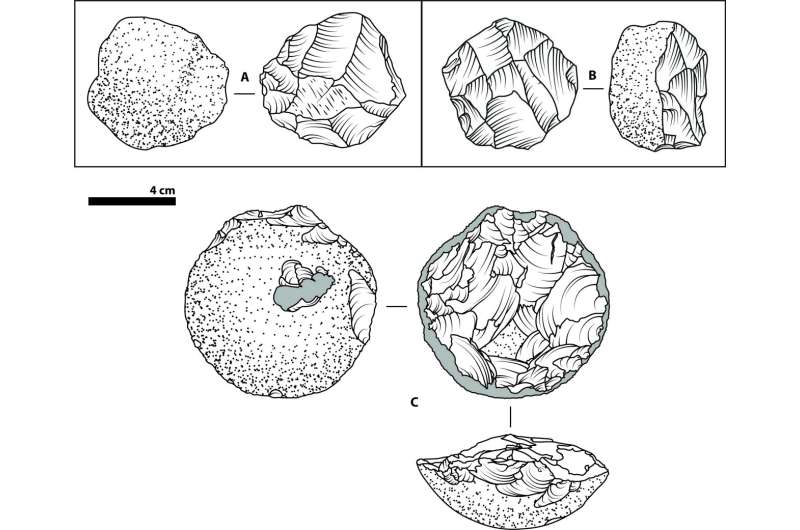Archaeologically excavated stone tools—some as much as 2.6 million years old—have been hailed as evidence for an early cultural heritage in human evolution. But are these tools proof that our ancestors were already becoming human, both mentally and culturally?
Dr. Claudio Tennie and William Snyder from the Department of Early Prehistory and Quaternary Ecology at the University of Tübingen (Germany) have tested this traditional interpretation. They draw a different conclusion: as shown by an experimental study, the earliest techniques for making stone tools can be spontaneously reinvented even without cultural transmission. They therefore are not evidence for the beginning of human culture, which possibly may have started much later, the researchers judge. The study was published in Science Advances.
Tools made from scratch
The authors asked 28 study participants (local adults, who did not study archaeology) to open a box containing monetary rewards. Participants were free to use provided raw materials—a painted glass hemisphere, a medium sized river pebble and a large granite block—in whatever manner they deemed suitable to break a rope that kept the box shut.
They were not given any information, let alone demonstrations and 25 participants proved—via post-test questionnaires—to have been naïve at the start of test with regard to production techniques of early stone tools. Despite their naivety, the majority innovated at least one of these techniques and proceeded to make and use the resulting tools to cut the rope locking the puzzle box. The authors found that every single production technique of early stone tools was thus re-innovated on the spot—from scratch—across the naïve participants.

2.6 million years old (A) and 1.7 million years old stone tools and an example of a result of the current experiment with subjects without prior knowledge (artifact C). © William D. Snyder et al
“These data contradict earlier claims that learning how to make any stone tools must be inherently difficult and that it therefore is impossible to do in the absence of models to copy,” says Claudio Tennie. “If the earliest stone tools in the human record really had been the first cases of human culture, then they should resist spontaneous innovation—they should not come about anew ‘from scratch,’ in the absence of cultural transmission.”
“When we asked other researchers about it before revealing our results, most did not predict this outcome. They strongly believed that all stone tool making requires copying. But it does not,” says Tennie.
“That stone tools existed 2.6 million years ago is no longer reliable ‘smoking gun’ evidence that our ancestors in the earliest Stone Age had culture like our own,” Snyder says. “We must now look at much later time periods for the origin of modern human culture.”
More information:
William D. Snyder et al, Early knapping techniques do not necessitate cultural transmission, Science Advances (2022). DOI: 10.1126/sciadv.abo2894
Provided by
Universitaet Tübingen
Citation:
Early stone tools were not rocket science (2022, July 6)


